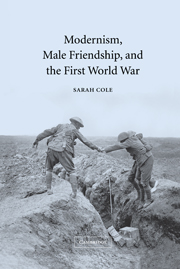Book contents
- Frontmatter
- Contents
- Acknowledgments
- Introduction
- 1 Victorian dreams, modern realities: Forster's classical imagination
- 2 Conradian alienation and imperial intimacy
- 3 “My killed friends are with me where I go”: friendship and comradeship at war
- 4 “The violence of the nightmare”: D. H. Lawrence and the aftermath of war
- Notes
- Index
Introduction
Published online by Cambridge University Press: 22 September 2009
- Frontmatter
- Contents
- Acknowledgments
- Introduction
- 1 Victorian dreams, modern realities: Forster's classical imagination
- 2 Conradian alienation and imperial intimacy
- 3 “My killed friends are with me where I go”: friendship and comradeship at war
- 4 “The violence of the nightmare”: D. H. Lawrence and the aftermath of war
- Notes
- Index
Summary
Estragon: How long have we been together all the time now?
Vladimir: I don't know. Fifty years maybe.
Vladimir: We can still part, if you think it would be better.
Estragon: It's not worth while now.
Silence.
Vladimir: No, it's not worth while now.
Silence.
Estragon: Well, shall we go?
Vladimir: Yes, let's go.
They do not move.
Samuel Beckett, Waiting for GodotARGUMENT: THE ORGANIZATION OF INTIMACY
In Samuel Beckett's drama, wholly intertwined and wildly dysfunctional pairs of men populate a beleaguered world. Male friendship in Waiting for Godot (1954) is what survives the trauma of modernity – war, violence, history itself – and in turns becomes emblematic of such a condition. The two old and ragged friends, who hold an unsteady history in their persons and in their tense interactions, seem all that is left of a faded past. What I shall argue in the forthcoming pages is that this connection between male intimacy and the representation of modernity characterizes many literary works from an earlier moment, when these frameworks were established and tested: the English modernist period. Thus, Beckett – writing in the mid twentieth century, purveying an aura of numbness, desperation, and resilience following the Second World War, embodying a position of complex national affiliation – nevertheless displays in exceptionally sparse and skeletal terms an idea that preoccupied writers of an earlier generation, as they confronted their own historical and national situations.
- Type
- Chapter
- Information
- Modernism, Male Friendship, and the First World War , pp. 1 - 20Publisher: Cambridge University PressPrint publication year: 2003



